After years of struggle. Indonesian community demands brands and banks stop doing business with palm oil company PT. Tegas Nusantara, Indigenous community in Bunin village, reclaim their land through participatory mapping.
On the border of the Leuser Ecosystem, the Bunin community has succeeded in securing legal recognition by the Indonesian government to manage 6,870 acres of their customary lands under the Village Forest scheme. The Bunin community are mostly descendants of Gayo, one of the tribes that inhabit the highlands of the Aceh province of Indonesia. This government program allows the Bunin community to manage their forests and develop initiatives to improve livelihoods and ecotourism. The program also allows the community to continue their traditions of farming, rattan seeking, honey harvesting, and depending on fishing in the river for their living.
However, despite this recognition, other parts of their customary lands remain threatened by a palm oil concession given to a company called PT. Tegas Nusantara (PT. TN). The Bunin community are now working together to collectively map their customary lands, community farms, and houses. The community hopes that the data collected can be used to encourage the district government of Aceh Timur, and the national government of Indonesia, to immediately revoke the PT. TN concession and support their efforts to manage and protect their customary lands and forests in perpetuity.
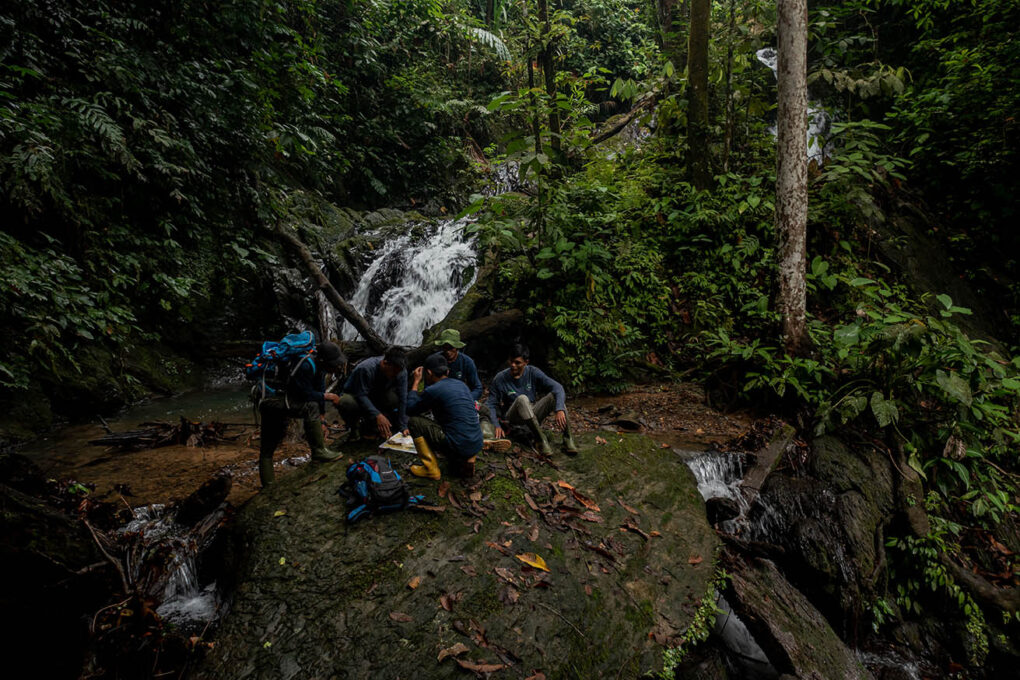
For decades, the land occupied by this community has maintained its beauty, health, and abundance. This is due to a reciprocal relationship between the community and nature. For generations, the land has been managed by the right hands, and the forest has been well preserved by the Bunin community — allowing them both to thrive. In addition, the community farms that they manage also produce high-value commodities such as durian, corn, petai, jengkol, coffee, rubber, cocoa and many other agroforestry commodities or non timber forest products that provide income and supports the welfare of the community.
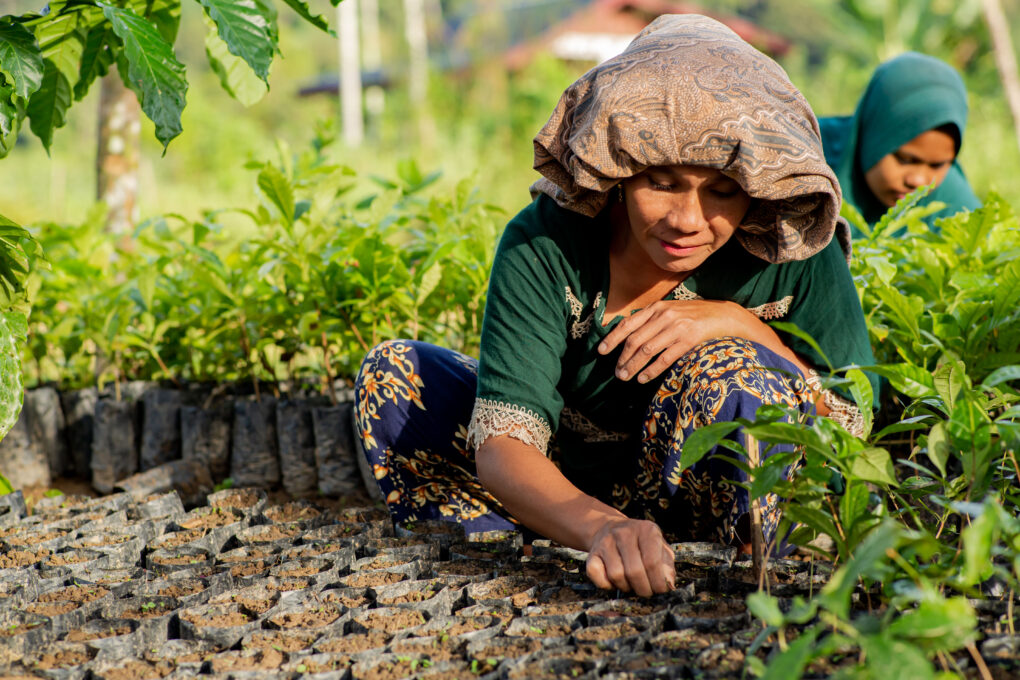
Unfortunately, even with this Village Forest recognition from the Ministry of Forestry and Environment, the community still faces threats and uncertainty. PT. Tegas Nusantara (PT. TN) had been given a permit No.34/HGU/BPN/2002 by the Ministry of Agrarian Affairs and Spatial Planning to use part of their village lands to establish a palm oil plantation. This permit was given without involving the communities around the area in the decision, so that the community did not know part of their customary lands were being allocated to PT. TN for development. PT. TN’s concession area overlaps with the Bunin village land, and the land of another 11 gampong (villages) in the district of Aceh Timur.
It’s been 20 years since PT. TN was allocated a palm oil development permit by the Indonesian government and during this time the Bunin community has opposed the development of palm oil plantations on their lands. They are worried about the condition of their customary forests, farms, and housing which they have occupied and used for decades — which conflict with the lands that have been allocated for palm oil development.The Bunin communities continue to advocate for their rights, including the right to revoke the permit for the PT. TN concession. There have been recent successes from their efforts as the district government of Aceh Timur has petitioned the national government to review the permit overlapping their lands. But the future of their lands that overlap with the PT. TN concession remain uncertain.
The district government of Aceh Timur has filed an inventory report through East Aceh District Head Letter No. 525.6/797 to the Ministry of Agrarian Affairs and Spatial Planning (BPN), dated January 27, 2020. This report asks the national government to return the land within the PT. TN concession to the Bunin community — this has been done several times in the last few years. On July 29, 2020 the Serbajadi Head of villagers forum wrote a letter to the Head of the Aceh BPN Regional Office, requesting the revocation of PT. TN permit, but there has been no response or action taken by the BPN to date. On November 20, 2020, the Bunin community met with the Chairman of Commission 1 of the Aceh People’s Representative Council (DPRA) requesting DPRA to encourage BPN to revoke PT. TN concession permit.
To address this issue, since 2021, Bunin community has collectively mapped 174 community farm points and 27 housing areas. By the end of 2022, at least 80% community housing and plantation that overlapped with PT. Tegas Nusantara concession had been identified. There are 289 community plantations and 48 housing units that have been mapped in total, with an area of approximately 600 hectares, a significant amount to encourage advocacy efforts for policy makers to immediately revoke PT. Tegas Nusantara concession.
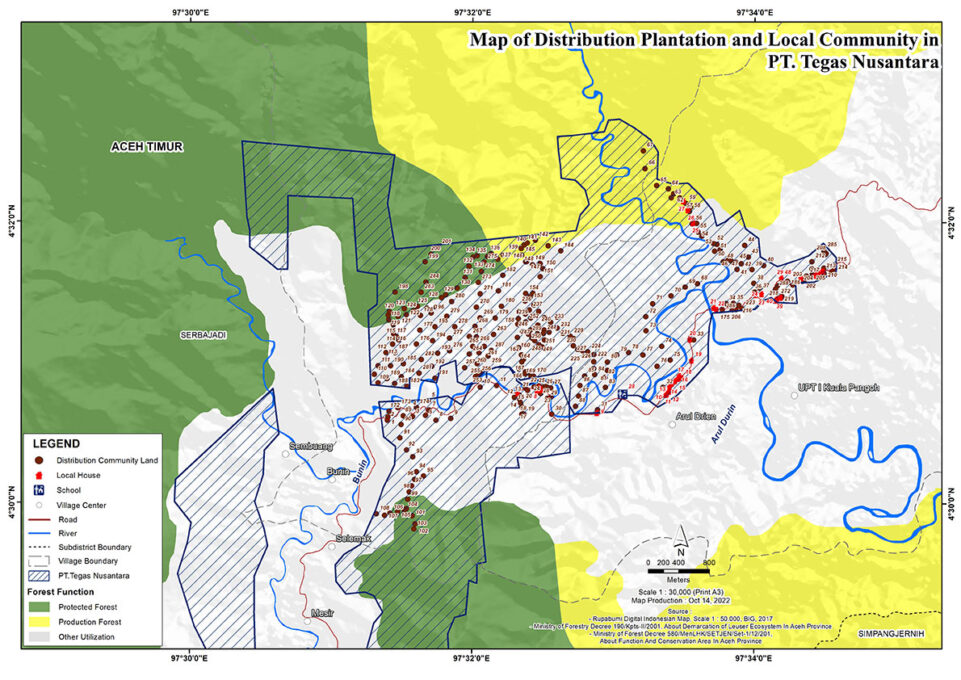
On Tuesday 16 May 2023, representatives of the Bunin Village Community accompanied by university student representatives carried out a direct action protest in front of the Aceh Spatial Plan (BPN) Regional Office and the Aceh People’s Representative Council (DPRA) Office. This action was carried out as a form of frustration among Bunin village community who always feel threatened because their houses and land overlap with the company’s concession and at any time the company may take their farms and land.
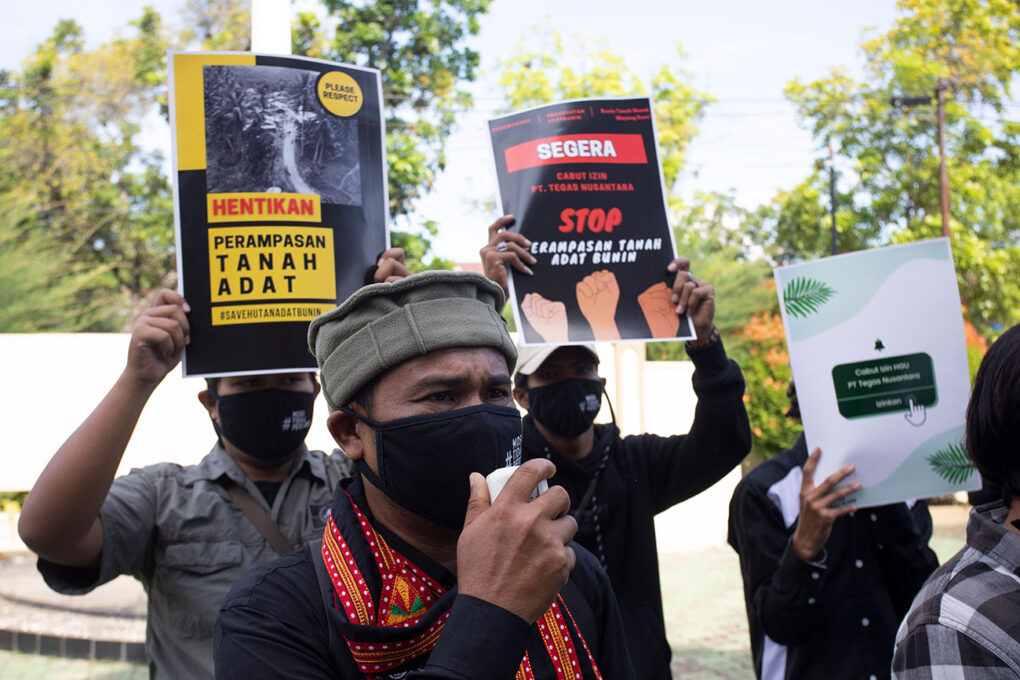
Mustakirun, the Head of Bunin Village, said that Bunin village is one of the oldest villages in East Aceh District. Historically, this village has had governance structure since 1840 — even the Bunin Village has now grown and become under two sub-districts and several villages. “Bunin Village is one of the oldest villages in East Aceh district. Our village is definitive and has had village governance since 1840. Our village head used to be called Reje Chiek, the name has changed to Keuchik according to the latest nomenclature now,” he stated.
At the protest, Bunin community’s representatives demanded that the Aceh BPN Regional Office form a committee to recognize the collective mapping data that they gathered, and use it as reference data to evaluate the concession permit for PT. Tegas Nusantara and immediately revoke PT. Tegas Nusantara’s concession permit especially those who are overlapped in the area of the Indigenous Peoples of Bunin. They also requested DPRA to form a special committee to conduct ground checking in the location where the community’s farm and housing overlap with the concession owned by PT. Tegas Nusantara. They hope that the government will immediately return their land rights that they have occupied for decades.
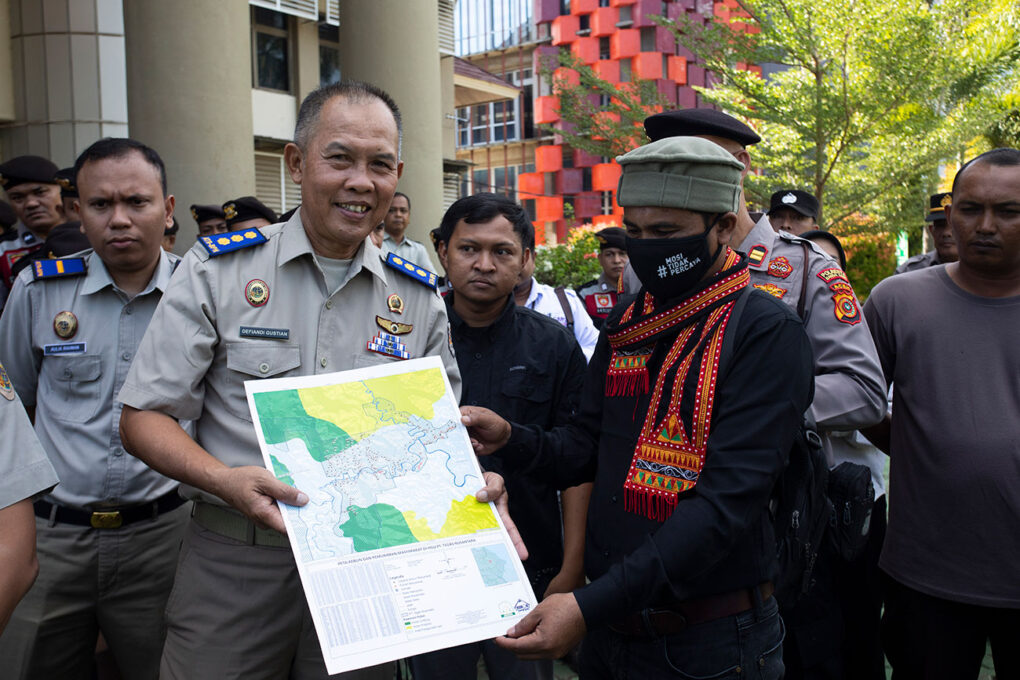
Head of Measurement Division for the Aceh BPN Regional Office Defiandi Gustian, in front of the protester said that BPN had written to PT. Tegas Nusantara for three times, but there’s no answer. The Aceh BPN Regional Office is currently in the process of proposing to revoke the permit to Central BPN because the land has been stranded for too long. He explained, if a village is included in the concession, BPN must exclude it from the concession area.
The Bunin village forest is an important example of world’s rainforests being stolen from Indigenous and local communities and destroyed for a quick profit. All around the world, customary lands remain under threat from palm oil companies to develop these lands for palm oil plantations, not only nature and biodiversity but also Bunin culture will remain under threat of being destroyed at an unprecedented rate for palm oil. Our climate, forests and communities face a common threat by corporate greed. We simply cannot stand by and allow this company that has violated the rights of the Bunin community to continue operating on their lands and the lands of neighboring communities.
We need to stand in solidarity with the Bunin Village and East Aceh government by supporting their call to review and revoke the palm oil permit for PT. Tegas Nusantara. Doing so will help to secure a stable climate, protect the world’s remaining biodiversity, and support the thriving communities in the Lokop Valley.
We continue to call on global brands and banks to #KeepForestsStanding, stop expansion of forest-risk commodities onto customary forests across Indonesia and throughout their global supply chains and investment portfolios.